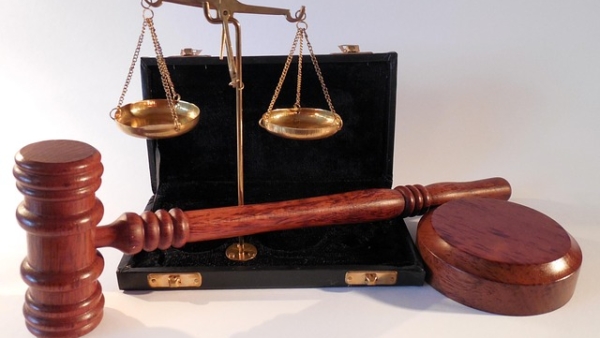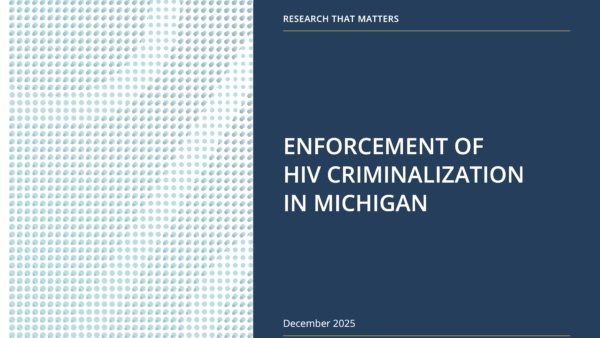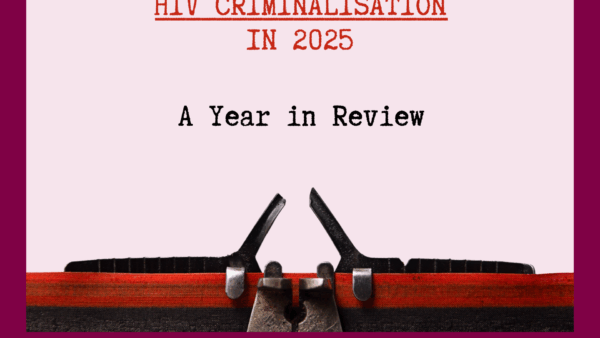How HIV Stigma Leads To The Criminalization Of Black Queer Communities
After the 1990s, many black and queer people have been charged with crimes related to stigma.
After the HIV/AIDS epidemic in the 1990s, many black and queer people have lived with the stigma attached to their communities.
The association between the disease and queerness began when many of the first cases involving HIV concerns were found among gay men in 1981. Though it has been proven having sex with queer folks doesn’t constitute transmission of HIV, many remain less informed on the topic.
This belief has filtered into the criminal justice system, where queer people have been targeted as the culprits of HIV and AIDS transmission. According to Centers for Disease Control and Prevention, 60 percent of black people who receive HIV diagnoses are queer, black men.
They say 90 percent of black heterosexual women have received a positive HIV diagnosis. Those who are infected with HIV often receive proper care, wear condoms, or have successfully suppressed the virus. Yet, black queer folks tend to have more encounters with the criminal justice system regarding possible HIV exposure, transmission, and disclosure.
In 2015, a black gay man named Michael Johnson was charged with reckless exposure in Missouri, for not disclosing his HIV positive status with his partners. Missouri’s law states partners must disclose their HIV positive status, even if they are practicing safe sex.
He was later portrayed by media and prosecutors as a predator, and often referred to as the screen name he used to meet potential partners: “Tiger Mandigo.” Because his accusers were white gay men, who possibly saw Johnson as a threat, he was sentenced to 30 years in prison.
HIV criminalization laws, like the one in Missouri, refuse to look at advances in HIV prevention and care. Instead, they look to lock up folks to stop the spread of what the law constitutes as a HIV epidemic.
Science has proven HIV criminalization laws are not reducing the transmission of HIV. They are actually scaring folks, especially in black/queer communities, from going in for a HIV screening. If their diagnosis comes back positive, and they don’t share that information with partners — for fear of abandonment by their partners due to the stigma that HIV holds — they are subject to criminal prosecution.
Since their formation, state laws have not been revised to reflect the advances in HIV treatment and prevention. Many HIV positive folks use condoms, ask for consent prior to sex, and receive treatment such as PreP. Some folks living with HIV are virally suppressed.
Science has also shown the likelihood of HIV transmission is rare even if it is intentional. Some state laws even criminalize those with HIV for spitting or biting during sex, when science has shown saliva is not a method of HIV transmission.
HIV criminalization laws specifically refuse to look at the evidence and use the stigma to target black queer communities for punishment, and exclude them from society. Southern states house 21 of the areas with the highest likelihood of transmission among black queer men.
The South also has the highest mass incarceration rates, with states like Louisiana and Mississippi locking up black people the most.
The logic, possibly, is if we lock away all those who are HIV positive for possibly transferring the virus to their partners, then the spread will be controlled and all risk will be eliminated. But, some rates of transmission have not changed despite HIV criminalization laws currently in place.
For example, between 2012 and 2016, the rate of black, gay, and bisexual men with HIV diagnoses remained the same.
However, black/queer folks bear the grunt of these laws as they are often the target of incarceration. A total of 38 states have laws that punish people for having potential to expose someone to a STD, which includes HIV.
Those laws include sentence enhancement if the case pertains to possible HIV exposure, transmission, or lack of disclosure. A total of 28 states have criminalization laws that are HIV specific. Then, 19 states specifically require those who are HIV positive to disclose their status to their sexual partners.
Two-thirds of those with HIV, who are facing prosecution in states with HIV specific laws, are black. In almost every case of HIV specific prosecution, the accused have been convicted and sentenced to prison.
Charging black queer people who are HIV positive with carceral punishment is another way of shaming them for enjoying pleasure in the guise of disease containment. If the point of ensuring safety from transmission is to contain the virus, then putting black queer folks in prison isn’t the answer.
It instead reinstates more violence onto black/queer folks, and disregards their safety in a justice system stacked against them. It has been proven placing those who are HIV positive into prisons doesn’t de-escalate the epidemic. It only delays the process of getting everyone infected the care they need.
It also continues to stigmatize black/queer communities who already have enough to worry about. States need to eliminate these HIV specific criminal laws and let black/queer communities live in peace.









